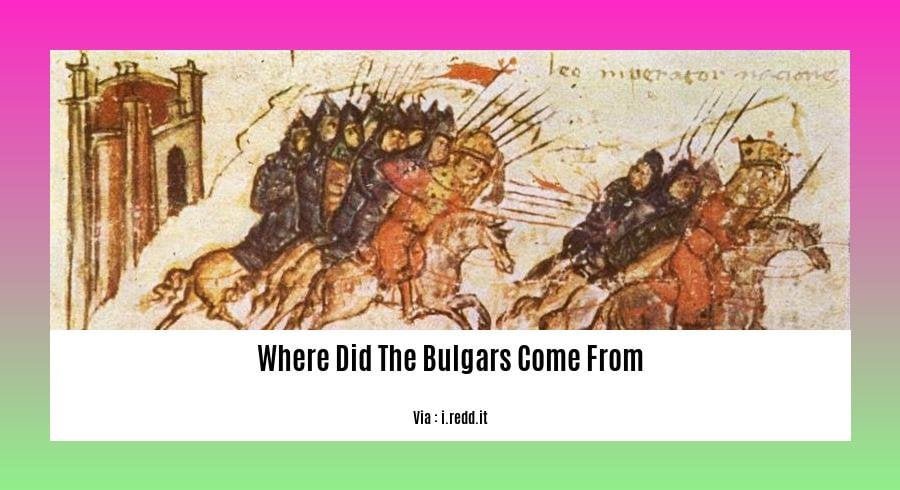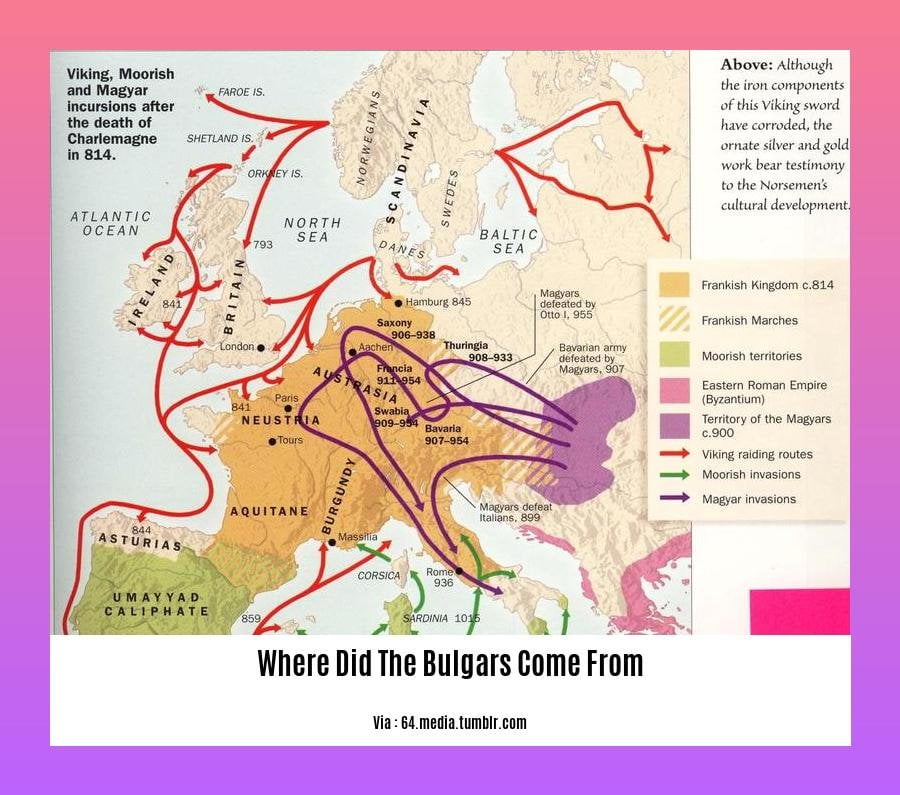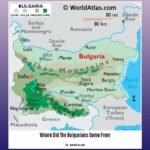[- Where Did the Bulgars Come From: Unraveling the Origins of a Mysterious People]: Embark on a captivating journey to uncover the enigmatic origins of the Bulgars, a people whose rich history has left an indelible mark on the tapestry of Europe and Asia. From ancient chronicles to archaeological discoveries, this article delves into the depths of their past, revealing the secrets of their migration, cultural influences, and lasting legacy. Join us as we unravel the mysteries surrounding the birth of a civilization that continues to fascinate historians and archaeologists to this day.
Key Takeaways:
The Bulgars originated as a semi-nomadic warrior tribe in the Pontic-Caspian steppe region from Central Asia.
Modern studies show close ties with Western Eurasian and European populations.
They established their presence in the northeast Balkans in the 7th century and became an integral part of early Bulgarian statehood.
The Bulgars contributed to the establishment of a government, societal structure, and influenced the development of early Bulgarian culture and customs.
They bequeathed their ethnonym to the modern Bulgarian ethnicity, but eventually assimilated into the Slavic population, losing their distinct identity.
Where Did The Bulgars Come From: Unraveling the Origins of a Mysterious People

Delving into the enigma surrounding the origins of the Bulgars, we embark on an enthralling historical voyage that captivates our imagination and transports us back to the heart of ancient Central Asia. Their nomadic existence and equestrian prowess propelled them onto the global stage, leaving an enduring legacy across vast swathes of Eurasia.
Unveiling the Bulgar Roots: Central Asia
The whispers of history trace the ancestral roots of the Bulgars to the vast and rugged landscapes of Central Asia, where they emerged as a formidable semi-nomadic tribe. Their mastery of horsemanship and skillful archery earned them renown as fierce warriors, striking fear into the hearts of their adversaries.
Their Journey to the Balkans: A Quest for New Horizons
Driven by the allure of new frontiers and the promise of richer pastures, the Bulgars embarked on a westward migration that brought them to the sun-kissed shores of the Balkans. Their arrival in the 7th century CE marked a pivotal moment in regional history, forever altering the political and cultural tapestry of the region.
The Amalgamation of Cultures: Blending with the Slavic Mosaic
As the Bulgars settled in their new Balkan homeland, they encountered a vibrant mosaic of Slavic peoples, each with their unique traditions and customs. Over time, these diverse groups underwent a remarkable process of amalgamation, with the Bulgars gradually absorbing and assimilating into the Slavic population. This cultural fusion forged a new society, one that synthesized the best of both worlds.
Their Profound Impact: Shaping the Course of History
The Bulgars left an indelible imprint on the Balkans, playing a pivotal role in the formation of early medieval Bulgarian statehood. Their organizational prowess and administrative acumen laid the foundation for a stable and prosperous society. The Bulgars also left behind a rich cultural legacy, influencing language, art, and customs, which continue to resonate to this day.
The Enigma of Their Origins: A Tapestry of Theories
The quest to unravel the enigma of Bulgar origins has captivated historians and scholars for centuries, inspiring a multitude of theories and debates. While their Central Asian roots are widely accepted, the precise details of their journey remain shrouded in mystery. Archaeological discoveries, genetic studies, and linguistic analysis offer tantalizing clues, yet many questions linger, inviting further exploration and research.
Explore the captivating history of the Bulgarian caves, where time stands still, and nature’s artistry adorns the underground world. history of the bulgarian caves
Delve into the enthralling world of Caves In Bulgaria, where stalactites and stalagmites create awe-inspiring formations that tell stories of ancient times. Caves In Bulgaria
Witness the birth of a nation as you uncover The History Of Bulgaria, a testament to resilience, bravery, and the indomitable spirit of a people. The History Of Bulgaria
Trace the roots of the Bulgarian people and their rich cultural heritage as you discover Where Did The Bulgarians Come From, a journey through time and ancestry. Where Did The Bulgarians Come From
The establishment of the First Bulgarian Empire
In the tapestry of Eastern European history, the Bulgars emerge as a fascinating thread, intertwining with the fabric of empires, migrations, and cultural transformations. Their arrival in the Balkans in the 7th century CE marked a pivotal moment, heralding the rise of the First Bulgarian Empire, a formidable force that left an indelible mark on the region’s destiny.
Key Takeaways:
Migration and Conquest: Led by Khan Asparukh, the Bulgars swept across the steppes, conquering Scythia Minor and establishing their dominion in the region known as Moesia, giving birth to Danubian Bulgaria, also hailed as the First Bulgarian Empire.
Political Consolidation: The Bulgars, under the leadership of Khan Asparukh and his successors, consolidated their power, extending their influence over vast territories, encompassing parts of present-day Bulgaria, Romania, and Ukraine. They formed a cohesive political entity, with the Bulgars serving as the ruling elite, while the Slavic population, already inhabiting the region, recognized their authority and rendered tribute to their Bulgar overlords.
Military Prowess: The strength of the Bulgarian Empire lay in its formidable military prowess. The Bulgars, renowned for their horsemanship and archery skills, maintained a well-equipped and disciplined army, enabling them to defend their territories and expand their frontiers through strategic conquests.
Cultural and Religious Legacy: The Bulgars underwent a profound transformation as they embraced Christianity as their official religion in the 9th century. This spiritual shift played a pivotal role in shaping their cultural identity, leading to the construction of magnificent churches and monasteries, the flourishing of the arts, and the emergence of a unique blend of Bulgar and Slavic cultural traditions.
Enduring Influence: The First Bulgarian Empire left an enduring legacy on the Balkans. Its administrative acumen and organizational prowess laid the foundation for a stable and prosperous society. The Bulgar language, customs, and art continue to resonate in the region, contributing to the rich cultural tapestry of Eastern Europe.
Sources:
Wikipedia: Bulgars
Britannica: History of Bulgaria
The conversion of the Bulgars to Christianity

Christianity has greatly influenced Bulgarian history and culture. So, how did Bulgaria become a Christian nation? Well, it’s a tale of political strategy, religious maneuvering, and a desire for international recognition. Let’s delve into this fascinating chapter of Bulgaria’s past.
Key Takeaways:
Khan Boris I’s Vision: In the 9th century, Khan Boris I, the ruler of Bulgaria, had a vision to unify his religiously diverse kingdom and gain recognition on the international stage, particularly in Christian Europe.
Byzantine and Eastern Frankish Influence: Bulgaria found itself caught between the influences of the Byzantine Empire, which propagated Christianity, and the Eastern Frankish missionaries.
Strategic Alliance with Byzantium: Boris I recognized the benefits of aligning with the Byzantine Empire and adopted Orthodox Christianity as Bulgaria’s official religion.
Church Council in Constantinople: A Church Council held in Constantinople solidified the relationship between Bulgaria and the Byzantine Empire, leading to the establishment of an independent Bulgarian Patriarchate.
Christianization’s Impact: The conversion to Christianity transformed Bulgaria’s religious landscape, strengthened its ties with the Byzantine Empire, and influenced Bulgarian culture, art, and literature.
A Journey of Faith and Diplomacy
Bulgaria’s conversion to Christianity wasn’t merely a religious shift; it was a strategic move by Khan Boris I to consolidate his power and elevate Bulgaria’s status in the international arena. He saw Christianity as a unifying force that could bridge the cultural gap between the Bulgars and the Slavic population, establishing a cohesive Bulgarian identity.
The adoption of Christianity also provided Bulgaria with much-needed allies in the Byzantine Empire, a powerful Christian state. This alliance shielded Bulgaria from external threats and opened up opportunities for trade and cultural exchange.
The Byzantine Embrace
Khan Boris I turned to the Byzantine Empire for guidance in implementing Christianity. He sent envoys to Constantinople, the Byzantine capital, seeking religious instruction and political support. The Byzantine emperor, Michael III, saw an opportunity to expand his influence in the Balkans and eagerly embraced Bulgaria’s request.
Byzantine missionaries flooded into Bulgaria, spreading the teachings of Christianity and establishing churches throughout the kingdom. The Byzantine clergy played a crucial role in educating the Bulgarian population about the new faith and its rituals.
An Enduring Legacy
The conversion of the Bulgars to Christianity left an indelible mark on Bulgarian history and culture. It fostered a sense of unity among the diverse population, strengthened ties with the Byzantine Empire, and laid the foundation for Bulgaria’s rich artistic and literary traditions.
Even today, Christianity remains a significant part of Bulgarian identity, with the majority of the population identifying as Eastern Orthodox Christians.
Relevant URL Sources:
– The Christianization of Bulgaria
– Bulgaria: A Country Study
The cultural and linguistic assimilation of the Bulgars into the Slavic population of the Balkans
Throughout the centuries, many peoples have intermingled in the Balkans, a dynamic region where cultures converge. Among these groups were the Bulgars, a Turkic people who left an indelible mark on the region’s history and identity.
A Tale of Transformation:
As the Bulgars migrated westward, they encountered the Slavs, who had already settled in the Balkans. Over time, these two distinct groups began to interact and merge, leading to a remarkable cultural and linguistic assimilation. This fusion resulted in a new society, one that blended Bulgar and Slavic elements, creating a unique tapestry of traditions, language, and identity.
Key Factors in Assimilation:
- Political Unity:
The formation of the Bulgarian Empire in the 7th century provided a framework for political unity and stability, fostering a sense of common identity among the diverse groups within the empire.
Geographical Proximity:
The close proximity of Bulgar and Slavic settlements facilitated regular interaction, trade, and intermarriage, creating opportunities for cultural exchange and mutual influence.
Shared Religious Beliefs:
The adoption of Christianity by both the Bulgars and the Slavs played a pivotal role in their assimilation. Christianity provided a common set of beliefs and values, strengthening the bonds between the two groups.
Bulgar Elite’s Role:
The Bulgar elite, while maintaining their political and military dominance, adopted many Slavic customs and practices, setting an example for the rest of the Bulgar population.
Slavic Language Dominance:
- Over time, the Slavic language gained prominence, becoming the primary language of communication and administration. This linguistic shift further facilitated the integration of the Bulgars into the Slavic population.
Legacy of Assimilation:
The cultural and linguistic assimilation of the Bulgars into the Slavic population of the Balkans had a profound impact on the region’s history. It laid the foundation for the emergence of modern Bulgaria, a country with a rich and diverse cultural heritage that reflects its Bulgar and Slavic roots. The assimilation process also contributed to the development of a distinct Balkan identity, characterized by a blend of various ethnic and cultural influences.
Key Takeaways:
- The cultural and linguistic assimilation of the Bulgars into the Slavic population of the Balkans was a gradual process that occurred over centuries.
- Several factors contributed to this assimilation, including political unity, geographical proximity, shared religious beliefs, the role of the Bulgar elite, and the dominance of the Slavic language.
- The assimilation process had a profound impact on the region’s history, leading to the emergence of modern Bulgaria and the development of a distinct Balkan identity.
Relevant URL Sources:
FAQ
Q1: Where did the Bulgars originate from?
A1: The Bulgars are believed to have originated from the steppes of Central Asia, specifically from the regions of Kazakhstan and the North Caucasian steppes.
Q2: What language did the Bulgars speak?
A2: The Bulgars spoke a Turkic language belonging to the Oghuric branch of the Turkic languages.
Q3: How did the Bulgars establish their presence in Europe?
A3: As semi-nomadic warrior tribes, the Bulgars embarked on a westward migration across the Eurasian Steppe, assimilating various tribal groups and cultural influences. They eventually reached the Pontic-Caspian steppe in the 7th century and established the polity known as Old Great Bulgaria.
Q4: What was the religious affiliation of the Bulgars before their Christianization?
A4: Prior to their Christianization in the 9th century, the Bulgars practiced pagan shamanism and held beliefs centered around the sky deity Tangra.
Q5: What happened to the Bulgars after the fall of Old Great Bulgaria?
A5: Following the defeat of Old Great Bulgaria by the Khazar Empire in 668 AD, the Bulgar tribes dispersed, with some migrating further westward and establishing new polities, including the Danubian Bulgaria founded by Khan Asparukh in 679 CE.
- China II Review: Delicious Food & Speedy Service - April 17, 2025
- Understand Virginia’s Flag: History & Debate - April 17, 2025
- Explore Long Island’s Map: Unique Regions & Insights - April 17, 2025
















